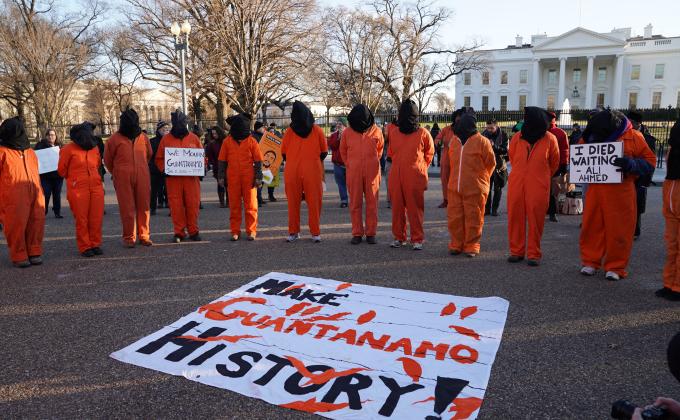On Wednesday 25 January 2012, ICCT hosted the Seminar "Terrorists on Trial: The Case of Zacarias Moussaoui" at Campus The Hague Location Stichthage, 13th Floor.

This seminar is part of the ICCT "Terrorists on Trial Seminar Series", which focuses on the performative and communicative aspects of a terrorist trial. The third in the series, it focused on the case of Zacarias Moussaoui, often refered to as the 20th hijacker, who was convicted of conspiring to kill U.S. citizens as a part of the 9/11 attacks. He was arrested on 16 August 2001 and was at first charged with an immigration violation. After the attacks on 11 September 2001, Moussaoui was charged with conspiring to hijack planes and crash them into the World Trade Center and the Pentagon. He admitted he knew about the attacks, but did not intervene to stop them. In May 2006 he was convicted and sentenced to life without parole, but many were surprised that the jury had not opted for the death penalty.
This seminar is part of the ICCT "Terrorists on Trial Seminar Series", which focuses on the performative and communicative aspects of a terrorist trial. The Series builds upon the earlier ICCT Expert Meeting "Terrorism Trials as Theatre" and the NIAS Research Theme Group "Terrorists on Trial. The Court Room as a Stage in the Struggle for Publicity, Public Support and Legitimacy". In the courtroom, it is judicially determined whether an act of protest, resistance, intimidation or violence amounts to "terrorism". Such verdicts reverberate in society; they have an impact on terrorists and their sympathisers and shape or break public support for government measures against terrorism. In this series, we will analyse a number of terrorism trials through the eyes of the actors or stakeholders in the court case: the prosecution, lawyers, victims, media, etc. By analysing the behaviour of terrorists in such trials and the role of all other parties involved, a fresh look may be taken at their judicial, political and social impact.
The seminar was introduced by Prof. Dr. Beatrice de Graaf (ICCT Research Fellow), who gave the first presentation with a comparative analysis of terrorist trials and how they can transform into theatrical, performative productions. De Graaf noted how the Nuremburg trials were the ultimate show trial, and highlighted how actors could use the performative aspects of the trial to convince the wider audience of guilt. She highlighted a key challenge when trying a terrorist: that with intense public interest, how can actors ensure a fair trial?
Subsequently, Prof. dr. Geert-Jan G. Knoops (International criminal law expert, Professor of International Criminal Law at Utrecht University) provided the background to the Moussaoui trial and analysed the proceedings from a legal stand point. He discussed the different approaches to terrorist trials in the US. With the Bush administration preferring closed Military Commissions, Obama has wavered between these and conventional federal trials. The Moussaoui case was a tried by a federal judge and Knoops discussed some of its key performative elements. He noted that throughout, Moussaoui was a difficult defendant and that, on many occasions, he simply wanted to use the courtroom as his stage.
Judge Leonie Brinkema (Judge presiding over the Zacarias Moussaoui Trial) gave an extensive presentation about the trial from her point of view. She recounted the intense media scrutiny and the difficulties experienced with the defendant and the measures she implemented to control the proceedings and ensure as fair a trial as possible. An interesting element, in terms of communicating the proceedings, was the need to include the victims of the 9/11 attacks who wanted to watch the trial. As the courthouse capacity was limited, closed circuit television filming was set up to enable victims to follow proceedings remotely. Several retired Judges presided over the CCTV link-up to ensure that the same decorum as in the actual courthouse prevailed. Brinkema emphasised the importance of impartiality in all trials and particularly those that garner extensive media attention. As a final point she recalled Moussaoui’s surprise when the verdict was read and he was convicted - but without the death penalty. After the verdict he requested to change his plea from ‘guilty’ because he never imagined he could get a fair trial with American jurors.
The meeting was chaired by Prof. Dr. Liesbeth Lijnzaad (extraordinary professor Practice of International Law at Maastricht University and Legal Advisor Netherlands Ministry of Foreign Affairs) who moderated a Q&A discussion which closed the meeting.
Agenda
19:00 – 19:05: Opening by the Chair Prof. Dr. Liesbeth Lijnzaad
19:05 – 19:15: Introduction by Prof. Dr. Beatrice de Graaf
19:15 - 19: 45: Presentation by Prof. dr. Geert-Jan G. Knoops
19:45 – 20:25: Presentation by Judge Leonie Brinkema
20:25 – 21:00: Panel Discussion and Q&A
21:00 – 22:00: Drinks Reception




